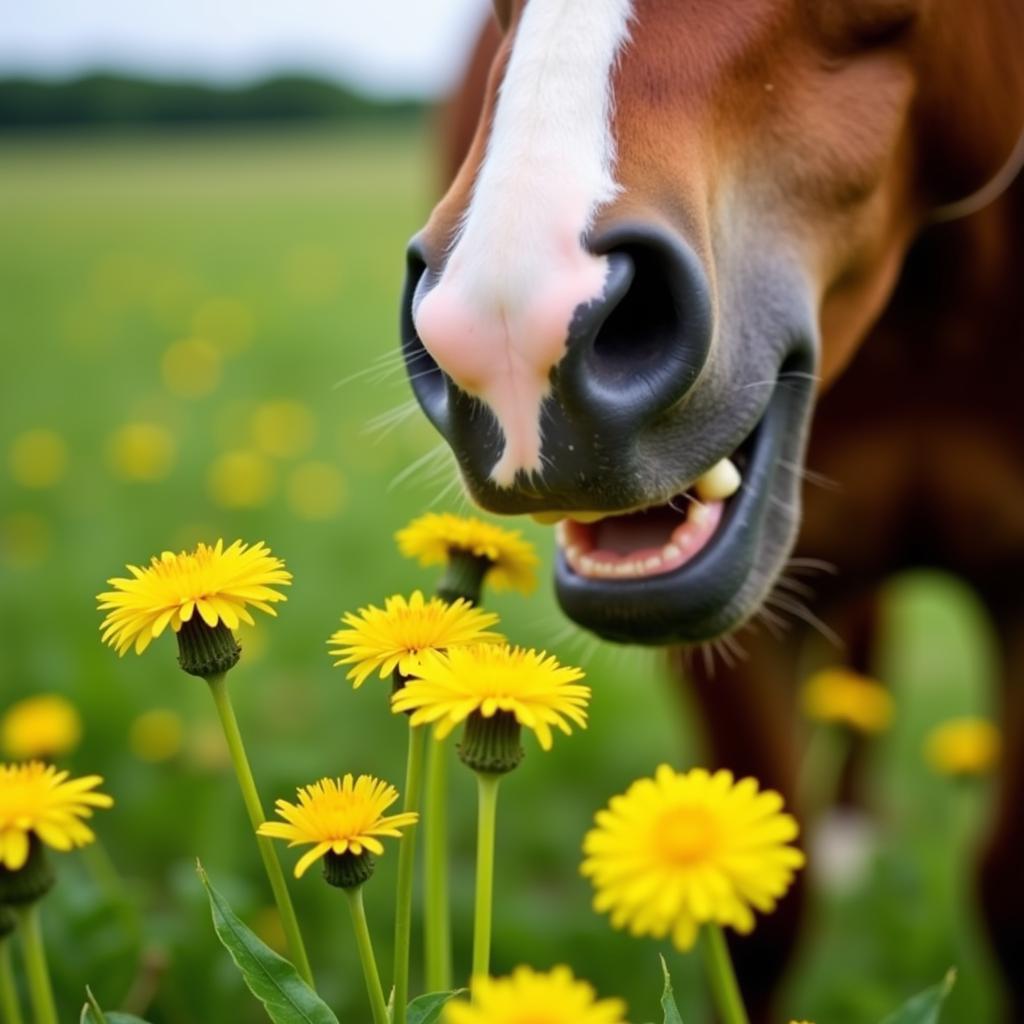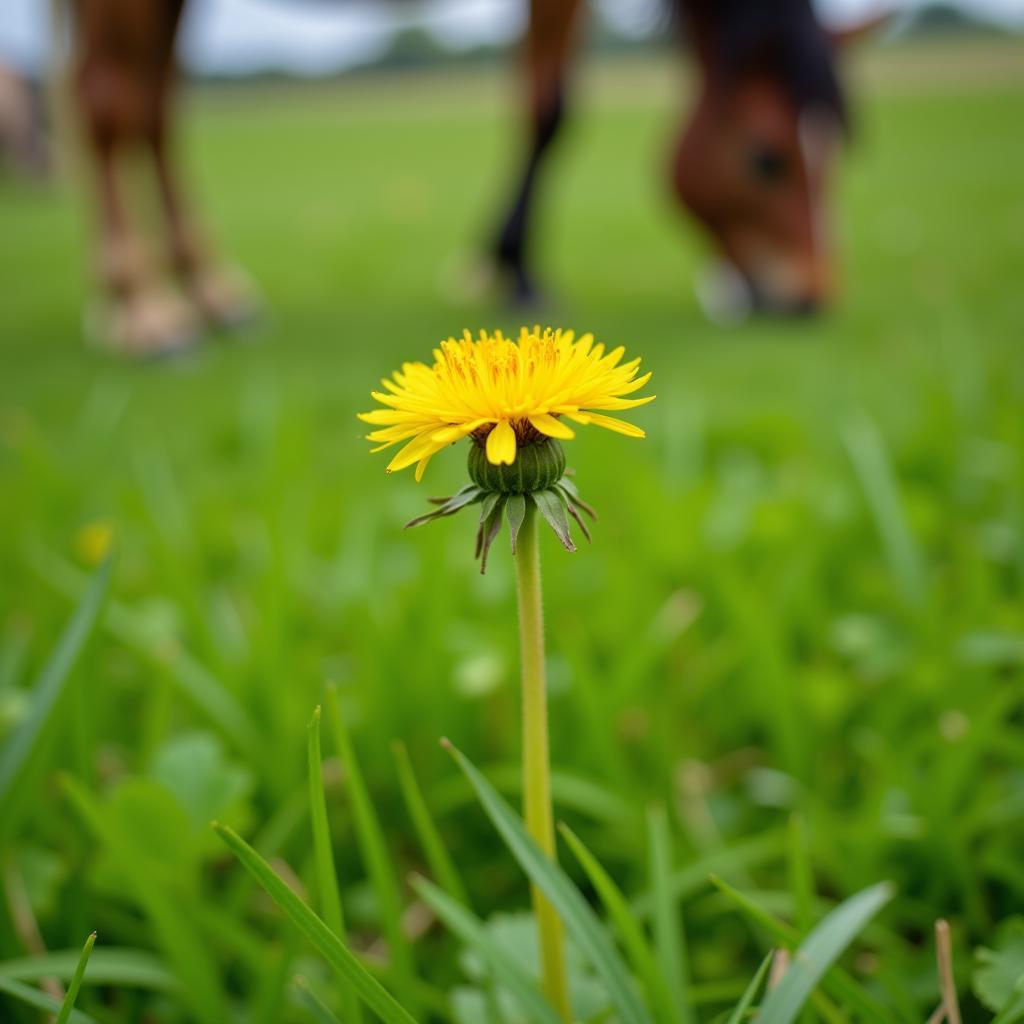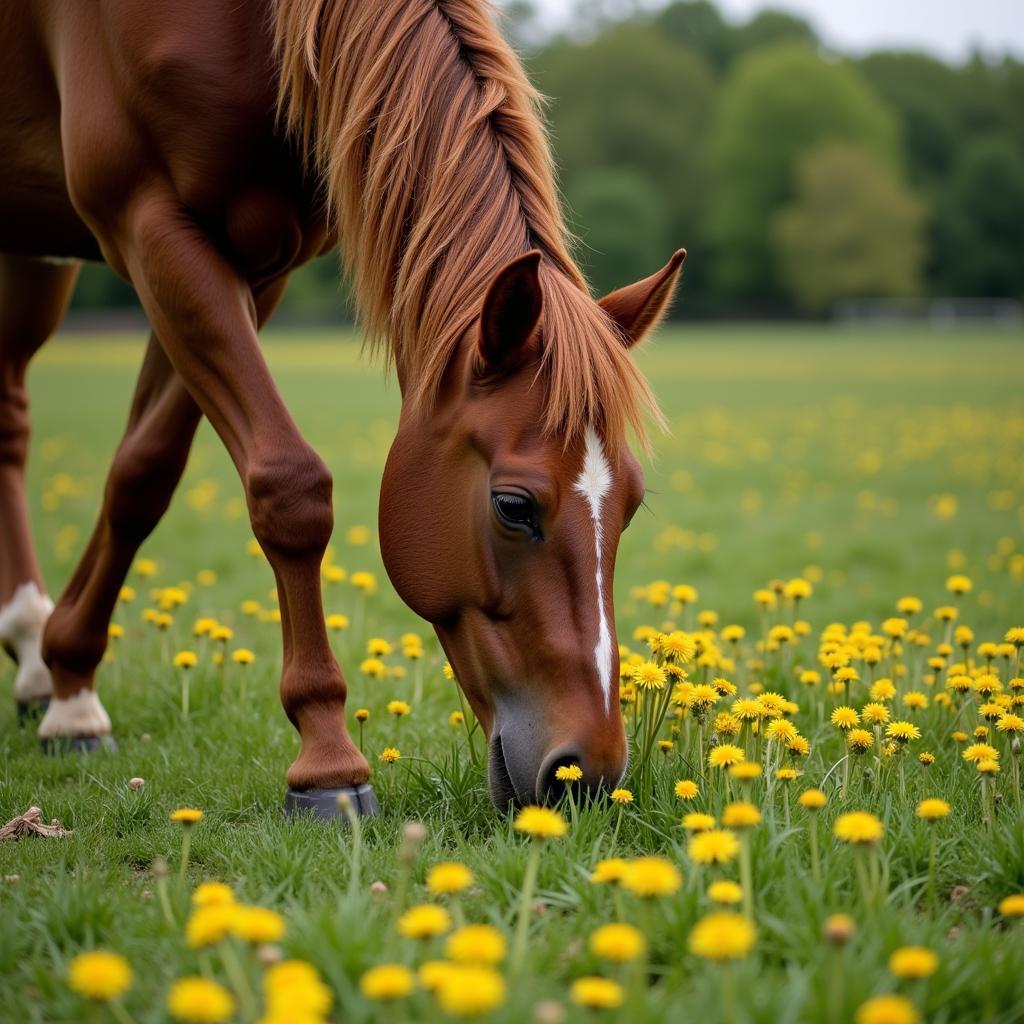Dandelions, those bright yellow flowers that pop up on lawns every spring, are often considered a pesky weed. However, these often-maligned plants can actually be a nutritious treat for your equine companions. But are dandelions good for horses? Like any forage, there are benefits and risks to consider before you let your horse graze freely on these sunny blossoms.
The Nutritional Value of Dandelions for Horses
Dandelions are surprisingly packed with vitamins and minerals that can benefit horses. They are an excellent source of vitamins A, C, and K, as well as potassium, calcium, and iron. These nutrients contribute to a healthy immune system, strong bones, and overall well-being in horses.
 Horse Eating Dandelions in a Field
Horse Eating Dandelions in a Field
- Vitamins A and C: Act as antioxidants, protecting cells from damage and supporting immune function.
- Vitamin K: Essential for blood clotting and bone health.
- Potassium: Helps regulate muscle function and fluid balance.
- Calcium: Crucial for strong bones and teeth.
- Iron: A key component of red blood cells, responsible for transporting oxygen throughout the body.
Beyond these essential nutrients, dandelions also contain beneficial compounds like flavonoids and carotenoids, which have antioxidant and anti-inflammatory properties. These compounds may help protect horses from chronic diseases and support overall health.
Are Dandelions Safe for Horses?
In moderation, dandelions are generally safe and even beneficial for horses. However, there are a few considerations to keep in mind:
Potential Risks:
- Overgrazing: While a few dandelions here and there won’t hurt, allowing horses to overgraze on them can lead to digestive upset, including diarrhea and colic.
- Herbicides and Pesticides: Be cautious of dandelions growing in areas treated with herbicides or pesticides, as these chemicals can be toxic to horses. Always ensure your horse’s grazing areas are free from chemical treatments.
- Allergies: While rare, some horses may have allergies or sensitivities to dandelions. If you notice any signs of an allergic reaction, such as hives, swelling, or difficulty breathing, contact your veterinarian immediately.
 Dandelion Growing in Horse Pasture
Dandelion Growing in Horse Pasture
Moderation is Key:
Like any treat or forage, moderation is crucial. Introducing dandelions gradually and in small amounts is key, especially if your horse is not used to consuming them. Monitor your horse for any adverse reactions and adjust the amount accordingly.
How to Offer Dandelions to Your Horse
If you decide to supplement your horse’s diet with dandelions, here are a few ways to do so safely:
- Hand-pick: Collect fresh dandelions from areas free of chemicals and offer them as a treat.
- Mix with Hay: Add a handful of dandelions to your horse’s regular hay ration.
- Grow Your Own: Consider dedicating a small area of your property to growing organic dandelions specifically for your horses.
Frequently Asked Questions About Horses and Dandelions
Q: Can horses eat dandelion leaves?
A: Yes, horses can eat both the leaves and flowers of dandelions. The leaves are also nutritious and offer similar health benefits.
Q: What about dandelion roots?
A: Dandelion roots are edible for horses and are believed to have detoxifying properties. However, they are more bitter than the leaves and flowers, so your horse might not find them as palatable.
Q: Can dandelions cause laminitis in horses?
A: While dandelions are not directly linked to laminitis, they are considered a high-sugar plant. Like any high-sugar food, moderation is important, especially for horses prone to laminitis or metabolic issues.
Q: Are there any alternatives to dandelions that offer similar benefits?
A: Yes, other horse-safe plants like cleavers, plantain, and chickweed offer a similar nutritional profile and can be included in a horse’s diet.
 Horse Grazing Near Dandelions in a Field
Horse Grazing Near Dandelions in a Field
Conclusion
Dandelions, often viewed as a nuisance, can actually provide a healthy and enjoyable treat for your equine friends. These readily available plants are packed with vitamins, minerals, and antioxidants that can support various aspects of horse health. However, it’s essential to introduce dandelions gradually, ensure they come from a safe and chemical-free environment, and offer them in moderation.
By understanding the benefits and risks associated with dandelions, you can make informed decisions about incorporating them into your horse’s diet. As always, if you have any concerns or questions, consult with your veterinarian or an equine nutritionist for personalized guidance.
For more information on horse care and nutrition, explore our website at horse stocking christmas.
Need personalized advice for your horse? Contact Justus Horses USA today! Call us at 0772127271, email us at [email protected], or visit us at QGM2+WX2, Vị Trung, Vị Thuỷ, Hậu Giang, Việt Nam. Our dedicated team is available 24/7 to assist you with all your horse care needs.